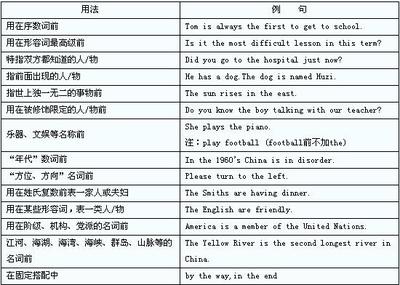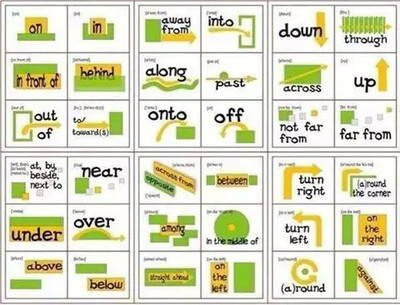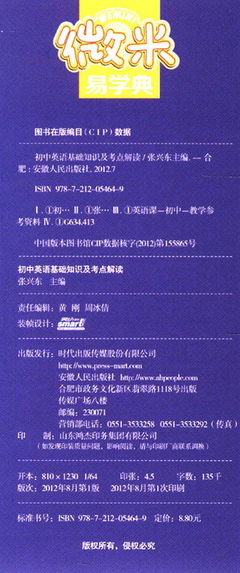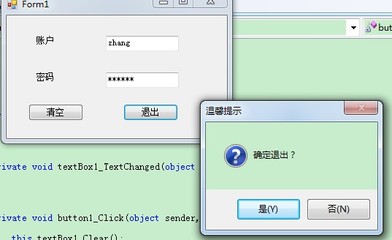《薄冰实用英语语法详解》连载之二:冠词
第一章、定冠词
1. 定冠词特指某个(某些)人或某个(某些)事物
Many people came here to visit the oldcastle.
很多人来这里参观这座古城堡。
The man in black is a magician.
穿黑色衣服的那个人是个魔术师。
2. 定冠词用于第二次提到或复述上文提过的人或事物
He was given a pen and a form. He is going to usethe pen to fill out the form.
他拿到一支笔和一张表。他要用这支笔填这张表。
They went into a small pub. The pub was crowded with people.
他们进了一家小餐馆,那个餐馆里挤满了人。
3. 定冠词用于交际环境中各方彼此熟悉的人或事物
The car is badly damaged.
这辆车损坏严重。(交际各方都知道是哪辆车)
Please close the door.
请关上门。(交际各方都知道是哪个门)
4. 定冠词用于可数名词前表示某一类人或事物
The wheel is said to be the first invention ofman.
据说,轮子是人类的第一项发明。
The horse is a useful animal.
马是一种有用的动物。
5.定冠词用于某些名词或形容词前,表示一类人、一个民族、阶级或阶层
the Chinese 中国人 | the poor 穷人 |
the nobility 贵族 | the boutgeoisie 资产阶级 |
the old 老年人 | the college students 大学生 |
the dead 死者 | the unemployed 失业者 |
the deaf 聋人 | the intellectuals 知识分子 |
the rich 富人 | the railway worlers 铁路工人 |
6. 定冠词表示世界上独一无二的事物
the sun 太阳 | the moon 月亮 |
the earth 地球 | the North Pole 北极 |
the universe 宇宙 | the globe 全球,全世界 |
the world 世界 | the atmosphere 大气层 |
7. 定冠词用于某些专有名词前面
用定冠词的专有名词 | 例 词 |
江河、海洋、海峡、 | the Changjiang River 长江 |
以普通名词构成的 | the People's Republic of China 中华人民共和国 |
公共建筑名称前 | the Beijing Station 北京火车站 |
报刊、杂志、书籍、 | The People's Daily 人民日报 |
姓氏的复数形式前 | the Browns 布朗一家 |
在海岛、山峰以及湖泊等地理名词前不加定冠词。如:
Christmas Island 圣诞岛 Mount Jolmo Lungma 珠穆朗玛峰 Lake Baikal贝加尔湖
但是与“of”连用时这类名词要加定冠词。如:
the Lake of Geneva 日内瓦湖 the Island of Taiwan 台湾岛
8. 定冠词用于形容词最高级前
This is the most interesting book I have everread.
这是我读过的最有趣的一本书。
He was the poorest man here years ago,but now he is a richman.
几年前他是这儿最穷的人,但现在他成了富人。
9. 定冠词用于序数词前
The first thing to be done now is to have a squaremeal.
现在要做的第一件事就是大吃一顿。
She is in the third group. 她在第三组。
10. 定冠词用于表示标准或单位的名词前
sell by the pound 论磅出售 | rent a house by the month 按月租房 |
buy coal by the ton 论吨买煤 | sell eggs by the dozen 论打出售鸡蛋 |
11. 定冠词用在play后与乐器连用
play the piano 弹钢琴 | play the violin 拉小提琴 | play the flute 吹笛子 |
12. 定冠词用于某些习语中
tell the truth 说真话 | put the blame on sb 归咎于某人 |
keep the peace 维持治安 | in the dark 在暗处 |
on the average 平均 | keep the house 居家不外出 |
in the air 在空中 | on the spot 当场 |
in the sun 在阳光下 | on the alert 警惕 |
on the right在右边 | in the distance在远处 |
act the lord 逞威风 | on the contrary 相反 |
by the way 顺便说一句 | out of the question不可能 |
in the right 有道理 | take the field 出征 |
carry the day 获胜 | in the future 未来 |
in the end 最终 | take the consequences 自食其果 |
on the air 广播 | burn the midnight oil 开夜车 |
to the point 切题 | beside the question 离题 |
play the fool 做傻事 | on the rise/fall 增长/下降 |
on the whole 总的说来 | on the increase/decrease 增长/下降 |
in the open 在户外 | in the morning/afternoon/evening |
第二章、不定冠词
1. 不定冠词指任何一类人、动物或事物
An ocean is bigger than a sea. 洋比海大。
A car must be insured. 汽车一定要上保险。
2. 不定冠词表示某个人或物
There is a Mr Bush to see you. 有位布什先生要见你。
English is a useful tool in our communication.
英语是我们交流中一种有用的工具。
3. 不定冠词用在某些数字表示的短语中
a million years一百万年 | a score of people 二十人 |
a dozen eggs 一打鸡蛋 | a thousand people 一千人 |
4. 不定冠词用在价格、速度、比率等短语中
5 pence a dozen 5便士一打 | 60 kilometers an hour 每小时六十公里 |
twice an hour 每小时两次 | forty hours a week 每星期40小时 |
5. 不定冠词用于某些习语
a long time 很长时间 | a few 有几个 |
a little 有一点 | get a grip of 掌握 |
in a wordord 总而言之 | in a temper 生气 |
keep an eye on 照看 | have a gallop 快马加 |
take a walk 散步 | at a loss 不知所措 |
have a try 试一下 | make a fool of… 捉弄…… |
all of a sudden 突然 | on a large scale 大规模地 |
make a racket 大声喧哗 | in a hurry 急忙 |
want a go 试一下 | as a matter of fact 事实上 |
take a break 休息一下 | take a bow 谢幕 |
as a rule 通常 | put an end to 结束 |
as a result 因此 | as a whole 一般地说 |
come to an end 结束 | have a good time 玩得痛快 |
with a view to 为了 | with a will 决心 |
have a cold 患感冒 | it's a pity that ... 真可惜 |
in a way 有些 | have a rest 休息一会儿 |
make a living 谋生 | have a word with 与……谈话 |
make a fire 生火 | make a fortune 发财 |
make a study of 研究 | take an interest in 对……感兴趣 |
第三章、零冠词1. 零冠词用于抽象名词前
Misfortunes never come singly. 祸不单行。
Wisdom is better than strength. 智慧胜于力量。
Sports is good for health. 运动有益于健康。
2. 零冠词用于物质名词前
The windows are all covered with boards.窗户全用木板堵上了。
Blood is thicker than water. 血浓于水。
3. 用零冠词的专有名词
(有称号或头衔的) | William Shakespeare 威廉-莎士比亚 |
村落、乡镇、城市等 | Craford Village 克拉福村 |
区、州、县、省、 | Florida 佛罗里达州 |
山峰、湖泊、海港、 | Fragrant Mountain 香山 |
街巷、花园、公园、 | Wall Street 华尔街 |
别墅、教堂、城堡、 | Nest Cottage 内斯特别墅 |
上帝、圣经等 | God 上帝 |
行星、星座等 | Mercury 水星 |
公司、工厂、农场、 | Dala Farm 达拉农场 |
议会、政府、总部 | Congress 国会(美国) |
语言 | English 英语 |
杂志、报纸等 | The New York Times 《纽约时报》 |
月份、星期、节假日等 | January 一月 |
4. 零冠词表示类别(零冠词用于复数名词前时表示类别)
Dogs are faithful animals. 狗是忠实的动物。
Apples are cheap in this area. 这个地区苹果很便宜。
5. 零冠词用于学科名称前
mathematics 数学 | chemistry 化学 |
astronomy 天文学 | psychology 心理学 |
6. 零冠词用于表示年份四季等的名词前
Day was fading into dark. 白昼逐渐消失在黑暗中。
It was late afternoon before he reached home.傍晚时候他才到家。
If winter comes, can spring be far behind? 冬天到了,春天还会远吗?
7. 零冠词用于某些习语
in effect 事实上 | by accident 偶然 | in hospital 住院 |
by air 乘飞机 | on duty 值班 | on foot 步行 |
under way 在进行中 | in advance 事先 | out of question 毫无疑问 |
冠词用法讲练
(一)冠词的位置
1) 在名词词组中,冠词一般放在最前面。例如:
the last fewdaysa really good concert
2) 名词词组里如果有all, both, exactly, just, many, quite,rather, such, what等词,这类词可以放在冠词之前。例如:
all thetimeboth (the) brothers
exactly the wrongcolourjust the right place
quite a nicedayrather a mess
such a funny story
3) 和as, how/however, so, too连用时, 形容词放在冠词之前。例如:
He’s not so big a fool as youthink.
She’s as clever a girl as you’re everlikely to meet.
This is too heavy a bag for me tocarry.
How large an armchair did he have?
However tiring a day she may have, she neverloses her good humour.
(二)不定冠词 (Indefinite Article)
1) a/an表示“任何一个(类)”,只能用于单数可数名词前。例如:
We are having a committee meeting thisafternoon.
a/an不用于不可数名词前。例如:
There will be discussion and argumentat the meeting.
He drinks milk every day.
2) 不可数名词用作可数名词时,可用a/an。例如:
I’ve just bought a lovely big Danishcheese.
I don’t like cheese.
She was inspired with a new courage.
She showed great courage.
3) 用于表示价格、速度、比率等名词前,如five pence a kilo, sixtykilometers an hour, four times a day等。
4) 用于下列这样的固定短语中。如a couple, a dozen, half a dozen, ahundred, a lot of, a great many, a great deal of, a largeamount/quantity of, a good number of 等。
I’ve done a great deal of work today. (不可数)
What a large number of books you have! (可数)
It’s a good five miles(=at least five miles,perhaps mote) to the station.
5)以元音开头的单词前不定冠词用an, 如:an apple, an egg, an item, an old man, anumbrella, an hour; 以辅音开头的单词前不定冠词用a university student, a humorousman。
定冠词的主要用法
a) 用于单数名词前,表示“某一类人或物”,以区别于其他人或物。例如:
The tiger is a fierce(凶猛的) animal. (相当于Atiger is a fierce animal.或Tigers are fierce animals.)
In this tribe the woman goes out hunting andthe man stays at home to look after the children.
下面三句中的斜体部分不能互换:
Who invented the radio? (指类别)
Who had a radio? (指同类中的任何一个)
Who manufactured radios?(指这一类中的所有个体)
man 指“人类”时,不用the。例如:
Man will conquer nature.
b) 用于指世上独一无二的东西,如 the moon,thesun,the world等。
c) 用于表示“乐器”的名词前,但一般不用于表示“体育运动”的名词前。例如:
Can you play the guitar?
I play football every day.
d) 用于某些形容词前,可表示“一类人”。例如:
The young are impatient;they wantchanges.
e) 一般不用于表示“疾病”的名词前。例如:
I’m just recovering fromrheumatism(风湿病).
下列病名前一般用a/an:
I have an ache in my head (a pain inthe neck).
He has a cold/a fever.
特指时需要用the。例如:
Jim has never really got over the malaria(疟疾)he caught inthe East
f) 一般不用于表示“膳食”的名词前,但有形容词修饰时用the。例如:
Breakfast is served at eight.
The wedding breakfast was held in herfather’s house.
如果泛指,用a/an。例如:
He gave us a good breakfast.
g) bed, church, college, court, hospital, market,prison, school, sea和work等名词用来指有关活动时,一般不用冠词。例如:
It’s time for children to go to bed.(指to sleep)
He goes to church every Sunday. (指topray)
After the crash,seven people were taken tohospital. (指to be cured)
He spent six months in prison. (指to bepunished)
After I leave school, I want to go to (a)university. (指to study)
Ken is a seaman. He spends most of his life atsea. (指to sail)
注:在美国英语中,通常用a/the hospital,a university。
出于其他目的,如去参观、访问这些地方或谈到这些地方时,根据情况用 a 或 the。
例如:
There is a bed in the room.
She was putting clean sheets on the bed.
The workmen went to the church to repair theroof.
Tom went to the prison to visit hisbrother.
I would love to live near the sea.
home 单独使用时,无冠词;有修饰语时,用 the 或 a。例如:
She left home.
We went to the bride's home.
I don’t have a home to go to in thiscity.
h) 当cinema, theatre,radio等名词用于表示“看电影、看戏、听无线电”时,一般要用 the。例如:
We went to the cinema last night.
Do you often go to the theatre?
I heard the news on the radio.
television 用于表示“看电视”时不用 the。例如:
I watched the news on television.
指“电视机”时用the。例如:
Can you turn off the television,please?(=the television set)
注:许多固定词组中的名词前通常没有冠词,需要熟记,如day after day,husband andwife,father and son,lock and key,heaven and hell等。
3) 专用名词前定冠词的主要用法
a) 一般不用于单数人名前,但特指或强调时需用the。例如:
He’s the Mr. Smith I saw yesterday.
也可说:
A Mr. Smith has come here. (=A man calledSmith has come here.)
复数人名前需用the,如the Johnsons, theCoopers。
b) 不用于“头衔+人名”前,但有头衔无人名时需用the,以表示特指。例如:
I saw Queen Elizabeth when l was inLondon。
I saw the Queen when I was in London.
c) 不用于国家、省市等名词前,但由短语组成的国名,或以s结尾的国名前需要用the。例如:
thePhilippinesthe Netherlands
the UnitedStatesthe United Kingdom
注:the Ukraine, the Congo, the Sudan, theHague为例外。
d) 用于表示国籍、民族的名词前。例如:
theBritishthe Chinese
theDutchthe English
c) 用于表示地区的名词前。例如:
the MiddleEastthe Far East
the north of England (但是:northernEngland)
f) 不用于街道、建筑等名词前,但有 of 介词短语修饰时,需用the。例如:
BroadwayRed Square
the Tower of Londonthe Great Wall of China
Sam lives on l2th Street.
They changed the name of Sixth Avenue to theAvenue of Americas.
g) 用于河流、海洋、群岛、山脉、海峡、海湾名词前。例如:
theMississippithe Atlantic
the PhilippineIslandsthe Andes
the EnglishChannelthe Persian Gulf
但不用于单个岛屿、山峰前。例如:
Sicily(Mount)Etna
h) 不用于大学名称前,但有 of 介词短语修饰时,需用the。例如:
YaleUniversityOxford University
the University of North Carolina
i) 不用于杂志名词前,但用于报纸名词前。例如:
NewsweekNatural History
the DailyNewsthe Washington Post
定冠词的常见用法
⑴用在单数名词前面,以代表同类的人或物,如:
The ox is a useful animal forfarmers.
This type of work is easierfor the teacher than for the student.
但当涉及 man 和 woman 这两个名词时,一般上不必用the :
Man is mortal.
Woman differs from man in manyways.
⑵用在单数名词前面来表示有关名词的抽象概念,如:
Don't play the fool.
Peter is fond of thebottle.
⑶用在数目字前面,如:
Mr Li is somewhere in the30s.
She was not yet born in the50s.
⑷用在测量单位前面,以表示“每”(each/per),如:
Some factory workers are paidby the hour.
This car usually does 15kilometres to the litre.
⑸用在比较级形容词或副词之前,以加强其意义,如:
The teacher explained the ideaagain, but his students were none the wiser.
Your mind will function allthe better if you have some time away from your work.
⑹用在“the more/better...the more/better...”结构里,如:
The more we practise, the morewe improve.
The better the staff, thebetter the performance.
⑺用在乐器名称之前,如:
The piano sounds better thanthe organ.
⑻用在剧院、电影院之前,如:
Do you often go to thecinema?
Tom went to the Lido lastweek.
⑼用在四个方向之前,如:
The sun rises in the east andsets in the west.
⑽用在复数姓氏之前,以表示有关家人,如:
The Browns will visit ustonight.
⑾用在某些惯用语之前,如:
We know the ins and outs ofthe matter.
Compare the pros and consbefore you make your decision.
七、冠词
1、Thank you for sending us ____ fresh vegetables ofmany kinds. You have done us ____ greatservice.
A、不填;aB、the;aC、不填;不填D、the;不填
【分析】A.第一空表示泛指,而第二空构成一个短语do sb. a greatservice,其意思为“给某人提供好的服务”。Service在这里为抽象名词具体化。
2、Young as he is, David has gained ____ richexperience in ____ society.
A、the; the B、a;不填C、不填;不填D、不填;the
【分析】C.experience意思为“经验”时是一个不可数名词,当意思为“经历”时是一个可数名词。本题是他在社会中赢得了很丰富的经验,experience在此为不可数名词,社会在这里是抽象名词,所以不加冠词。
3、The police have ____ power to deal with suchmatters by ____ law.
A、the; theB、不填;不填C、不填;the D、the;不填
【分析】D.句子第一空后面的不定式做定语对power进行修饰,特指某种权力,用定冠词the;而第二空后面的law泛指“法律”这一概念,不用冠词。
4.—— “Do you know ______ English for ‘帅哥’?”
—— “I’m afraid I don’t. I’m not interested in _______ Englishlanguage.”
A. the,theB. the, 不填 C. 不填,the D. 不填, 不填
【分析】A。在英语中,表示语言的名词前通常不用冠词,但在某些特殊情况下可用冠词。如:
(1) 当语言名词表特指意义,其前可用定冠词。如:
The English spoken in America and Canada is a little differentfrom that spoken in England.
美国和加拿大讲的英语与英国讲的英语有点不同。
(2) 当语言名词表示某一语言中的对应词时,其前要用定冠词。如:
What’s the English for this? 这个东西用英语怎么说?
(3) 当在语言名词后加上 language一词时,也要用冠词。如:
There have been many changes in the history of the Englishlanguage. 英语发展过程中有很多变革。
2. I couldn’t remember the exact date of the storm, but I knewit was ______ Sunday because everybody was at ______ church.
A. a, the B. a, 不填 C. 不填,aD. 不填, 不填
【分析】B。确实,在通常情况下星期名词前不用冠词,但在某些特殊情况下还是可以用冠词的,如表示特指,其前可用定冠词;表示“某一个”或受描绘性定语修饰表示“某种”这样的意义等,其前可用不定冠词。如:
He came on the Sunday and went away on the Monday.他星期日来,星期一就走了。
My birthday happened to be on a Saturday. 我的生日碰巧是星期六。
3. Which person do you refer to, the one with ______ longhairorthe one with _______ longbeard?
A. a, a B.不填,不填 C. a,不填D. 不填,a
【分析】D。hair 和 beard 在用法上并不完全相同:hair可用作可数或不可数名词,用作可数名词时,指一根一根的毛发或头发,如说 There’s a hair in my soup(我的汤里有根头发);用作不可数名词(集合名词)时,则是整体地指一个人的头发。比较:
He has gray hairs. 他有几根白发了。
He has gray hair. 他满头白发了。
而beard则通常只用作可数名词,且指的是一个人所有的胡须,而不是指一根胡须,它的复数形式,通常是指多个人的胡须,而不是指多根胡须,如:
He no longer wears a beard. 他不再留胡须。
Not all men grow beards. 并不是所有的男人都留胡须。
4. I once watched _______ one-act play, which was played by_______ 11-year-old boy.
A. a, a B.an, an C. a,anD. an, a
【分析】C。第一空填 a,因为 one-act的第一个音是辅音不是元音;第二空填an,是因为11的英文是eleven它的第一个音是元音不是辅音。类似:
(1) Before he was arrested, he had taken _______ one-monthholiday, and stayed in the country with ________ 18-year-old girl,one of his students.
A. a, a B. an, an C. a,an D. an,a
(2) We hired _______ one-eyed man to play in our film, and wegave him _______ 100-pound check for just one minute.
A. a, an B. an, a C. a, a D.an, an
5.—— “Have you seen _____ pen? I left it here this morning.”
——“Is it _____ black one? I think I saw it somewhere.”
A. a, the B. the, the C. a,aD. the, a
【分析】C。第一空填a,比较好理解;而第二空填a是因为此句中的one 并非指前面提到的 pen,即这里的 one 与前面的pen 并非同一事物,这从后面一句的 I think I saw it somewhere 可以清楚地知道。比较:
——“Have you seen _____ pen? I left it here this morning.”
—— “Is it _____ black one? I found it in the corner.”
A. a, the B. the, the C. a,a D. the, a
注意其后 I found it in the corner这一信息,它表明说明者是拿着笔在与对方说话。再如:
——“Have you seen _______ new bike? I put it here just now.”
—— “Is it _______ white one? A boy has ridden it away.”
A. a; a B. a; the C. the;the D. the; a
注意其后的 A boy has ridden it away 表明自行车已不在说话者身旁.
the定冠词省不得
在下面这段和产业买卖有关的英文里,存在着 4个错误。你看得出来吗?
“If you have the intention tosell your flat. Please don't hesitate to call us, we'll offer youhightest selling price.”
第一个错误是句型形式“have the intentionto sell”的错误;正确的形式是:intend to sell 或 have the intention ofselling.
另外两个错误和标点符号有关。一个是在副词分句后面不该用句点而用;另一个是应该用句点的地方而不用。
“If...flat”是条件副词分句,不可独立生存,必须依赖后头的主句“please...us”,才可以成为完整的复杂句(complexsentence)。这样一来,主句前面的句点,就要改成逗号(,)了。
另外一个错误是两个主句之间既没有句点也没有连接词,而只有逗号;这种错误叫 run-on sentence:
“..., please don't hesitate tocall us, we...”
这个句子里的逗号(,)要改为句点(。)才对:
“...。Please don't hesitate tocall us. We...”
不用句点也可以,但要用恰当的连接词,如:
“..., please don't hesitate tocall us, as we'll offer you...”
谈了3个错误,现在来谈最后一个错误,就是定冠词(definite article)的消失:
“We'll offer you highestselling price.”
习惯上,最高级形容词(the superlativedegree of adjectives)前面要用定冠词 the。因此,这句话要改为:
“We'll offer you the highestselling price.”
必须使用定冠词的例子
接下来,顺便把其他必须用定冠词的场合列下,作为参考。
㈠ 表示世上唯一的事物,如:
① the sun; the earth; the sky;the North Pole
㈡ 当一个名词被再次提起时,如:
② A car knocked against atree. We can still see the mark on the tree made by the car.
㈢ 当名词后面有个修饰作用的短语或分句时,如:
③ The girl in red is mysister.
④ The thief who stole yourwallet yesterday was arrested.
㈣ 加在某些形容词前面,以表示某类人或事,如:
⑤ The rich often get richerand the poor, poorer.
⑥ The doctor lost no time ingiving help to the injured.
⑦ Don't expect theimpossible.
㈤ 加在某些山川、河流、岛屿、国家名称之前,如:
⑧ the Alps; the Thames; theBritish Isles; the Philippines; the Atlantic Ocean.
2010年高考英语试题分类汇编——冠词
(10福建)
21. It’sgoodfeeling for people to admire the Shanghai World Expo that givesthempleasure.
A. 不填,aB. a,不填C. the, aD. a, the
21. 答案:B
考点:冠词的使用
解析:good feeling并非特指,故用a;pleasure是抽象名词,无需冠词。句意为“人们喜欢上海世博会给它们的快乐,这是(一)种不错的感觉” a good feeling , 一种不错的感觉,give sb pleasure。
(10山东)
22. If we sit near _______ front of the bus, we’ll have _______better view.
A. 不填;theB.不填;aC. the;aD. the;the
答案:C
考点: 本题考查冠词在具体语境中的使用。
解析: 句意应为“如果我们坐在公共汽车的前部,就会有更好的视野。”表示“某空间内部的前部”时,front前要加定冠词the;have a good view是习惯搭配,表示“视野开阔,视野良好”之意;所以C项符合语境。
(10江苏)
21. The visitors here are greatly impressed by the factthat_______ people from all walks of life are working hard for_____new Jiangsu.
A.不填; a B.不填;the C.the; a D.the; the
选A. 第一空,来自社会各阶层的人. 是不特指,不用冠词. 第二空, 在Jiangsu 前有形容词new因此,应加冠词a.表示一个全新的江苏
(10辽宁)
22.There are over 58, 000 rocky objects in _______ space, about900 of which could fall down onto _______ earth.
A. the;theB. 不填;theC. the;不填D. a; the
答案:B
句意:太空中有超过58,000的岩状物体,其中大约900有可能掉到地球上。
解析:考查冠词。第一空in space是固定短语,不用冠词,第二空名词earth属于独一无二事物的名词,其前必须用定冠词。
(10北京)
35. First impressions are the most lasting. After all, you neverget __ second chance to make __ first impression.
A. a;theB. the;theC. a;aD. the; a
35. 答案:A
考点: 冠词
解析:很多同学错在第二个空to make a firstimpression上了。在做题的时候不够细心,因为此题的句意是:第一印象是最持久的。总之,你永远不可能有第二个机会去再给别人留一次第一印象。本题强调的重点是第二个机会asecond chance;第二次留一个第一印象,make a first impression. first为干扰因素。
若句意改变为:你没有机会去改变你的第一印象You never get a secondchance to change the first impression。此处再填the就合情合理了。
(10重庆)
27. Everything comes withprice;there is no suchthingas free lunch in the world.
A. a,aB. the,/C. the,aD. a, /
27. 答案D
考点:考查冠词。
解析: price意思是“代价”,为可数名词,第二空前边有no,后面的名词不用冠词,故选 D项。
(10浙江)
2. Many lifestyle patterns do suchgreatharm to health that they actually speed up
weakeningof the human body.
A. a;/B. /; the
C. a;theD. /;/
答案:B
考点:本题考查冠词。
解析:句意:许多生活方式对人类的健康有害,他们加速了人类身体的衰退。本题考查冠词,对……有害用短语“do harmto”表示,中间无需冠词;之后的weakening是由动词的ing形式表示抽象的名词,表达一种概念、状况时需要加上the。
(10四川)
2.Inmost countries, a university degree can give youflyingstart in life.
A. the;aB. the; 不填C.不填;不填D.不填; a
答案:D
考点:考查冠词。
解析: mostcountries此处表泛指,most前不加定冠词the.第二个空处应为“一个高起点的开始”,故用a ,正确答案为D。
 爱华网
爱华网




